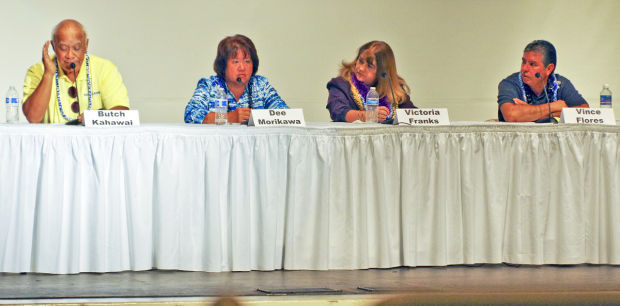WAIMEA — The four candidates vying to represent the South Shore and Westside of Kauai in the state Legislature sparred on a number of issues during their first primary election forum, ranging from the Hawaii Superferry to marijuana distribution centers.
WAIMEA — The four candidates vying to represent the South Shore and Westside of Kauai in the state Legislature sparred on a number of issues during their first primary election forum, ranging from the Hawaii Superferry to marijuana distribution centers.
At the start of the Monday forum at Waimea Theater, the two Democrats and two Republicans battling for a single House District 16 seat expressed support for the Pacific Missile Range Facility, citing its strategic position with Asia and jobs supported by it.
It was the only time, however, that Democrats Thomas “Butch” Kahawai and Daynette “Dee” Morikawa, and Republicans Victoria “Vickie” Franks and Vince Flores, would find common ground on any issue.
Marijuana distribution centers
When asked about their position on proposed marijuana distribution centers on Kauai, Kahawai, Flores and Franks spoke out against it, saying that the proposal could exacerbate current problems on Kauai.
“I believe that it will open so many doors that we won’t be able to deal with,” Kahawai said. “We’re already having a hard time right now and to just legalize the distribution of marijuana is asking for trouble.”
Medical marijuana, Morikawa said, is already legal in the state and can help terminally ill patients who cannot be healed in any other way.
The problem, she said, is finding a proper avenue to regulate the growth of marijuana and the distribution of it to medical patients who need it.
“Don’t get me wrong, I don’t support recreational marijuana,” Morikawa said. “The only way we can do distribution, as safe as possible, is through a dispensary system. Now, my take on the dispensary system, and I would hope that this could happen, is to do it through the state hospitals because the state hospitals need funding.”
The Hawaii Superferry
Franks, Kahawai and Morikawa voiced their support for efforts to resurrect the Hawaii Superferry, saying that it would provide a cheaper alternative to interisland travel.
Future efforts, they also agreed, must be conducted through the proper legal channels to avoid past mistakes that ultimately led to the Superferry’s downfall last time.
“I think that it will provide more local jobs,” Franks said. “I think it will increase tourism because it costs a lot to get on a plane. People love to come here to Kauai, but a lot of them can’t afford to fly over, honestly, so I think it would open more doors for the visitor industry.”
Flores, meanwhile, said he supports the idea of reviving the Hawaii Superferry but is concerned about the possible transportation of narcotics between islands.
“They will use it — they use it in our mail, they use it everywhere, but my concern is how it will affect our island of Kauai,” Flores said. “Is it going to be like the airport, where it’s secured? As the whole part, whoever will be running the Superferry, will they be held accountable and disciplined, if a drug transaction happens on Kauai — not just the people who transported the drugs but those whose oversight allowed the drugs to come here?”
GMO industry
When asked about his position about the genetically modified organism industry on Kauai, Kahawai said he supports their broad effort “to feed the world.”
These same companies, he added, are also tasked with ensuring that the community is safe.
“You know, I’m going to say this, to be honest, I use pesticides, I use herbicides,” Kahawai quipped. “I get tired of pulling my weeds, so I spray them. I make sure I don’t spray my neighbor’s one. And that’s the issue for me — we are all neighbors, we are all a community here. We need to take care of each other.”
During a recent visit to Polihale, Morikawa said she saw seed companies taking steps to create buffer areas and lay down ground cover to address runoff.
Morikawa said she supports pesticide regulation, enforcement and disclosure but acknowledged that the state must also step up and do its part.
“If we are being poisoned by pesticide use, we need to know, but the state Department of Health and Department of Agriculture needs to step up and make sure they are out there to check and see if this is what is happening,” Morikawa said. “I think they’re starting to do that, and I think as long as we have a sense that we’re OK, then it’s OK — we can thrive together. That is the balance that I need to find.”
Franks said she was concerned about the effect of GMO labeling on local jobs, food costs, food items that can be brought into the state and family farms.
Many of the pesticides used by the seed industry, she said, are approved by the U.S. Department of Agriculture and U.S. Food and Drug Administration and are similar to those that are available to many consumers.
“Any pesticide can cause issues but most of it is not any different than what we have at home,” Franks said.
Flores, however, said he is not so sure.
“Anybody who I go to and ask how much are you guys are spraying, they cannot give me an answer,” Flores said. “If they cannot give me paperwork and facts about how much they’re spraying, it seems like somebody’s hiding something.”
The Lawai resident said he is against genetically modified organisms but questioned whether landowners are also offering residents the same leasing opportunities provided to large seed companies.
Flores said he lost affordable leases for grazing land because larger companies were able to pay more.
“We’re losing our perspective about what’s going on here on our aina,” Flores said.


